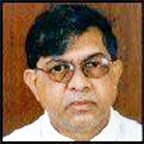– Former WICB corporate secretary Tony Deyal gives evidence before London International Court of Arbitration on behalf of DIgicel
In an ironic twist to the latest row afflicting West Indies cricket, Tony Deyal has given evidence before the London International Court of Arbitration (LICA) on behalf of Digicel in its case against the West Indies Cricket Board (WICB) over the scheduled 20/20 match for US$20 million between the Stanford Superstars and England.
Deyal was fired by the WICB as its corporate secretary July 25 and is suing it for wrongful dismissal. He flew to London last week and filed an affidavit at the LICA’s hearing on Friday, it was confirmed yesterday by a source in London close to the case.
It is the second time Deyal is on the other side of the fence to his former employers. Immediately prior to his appointment as corporate secretary just over two years ago, he was an advisor to the West Indies Players Association (WIPA) during its several disputes with the WICB.
Kieran Foley, head of sponsorship, presented the case for Digicel, the Irish telecommunications company that is the main sponsor of West Indies cricket.
Chief executive Donald Peters and head of finance, Barry Thomas, represented the WICB.
Although Digicel denied Stanford’s request to be involved in the arbitration, claiming it would “disrupt” the hearings, it is understood that Andrea Stoelker, president of the Stanford 20/20, accompanied the WICB officials as an observer.

The settlement of Justice David Steel, who presided over the hearings, is expected within a day or two.
Whatever is decided, the WICB is certain to face a hefty bill from the LICA and from lawyers. Even if individual law suits do not follow, its future relationships with Digicel and Stanford, its major financial backers, have been clearly damaged.
Digicel and the WICB entered into a five-year US$20m contract to initially end in January 2010 but extended last year until 2012.
Sir Allen Stanford, the Texan billionaire who has based part of his Stanford Financial Group in Antigua for the past 26 years, initiated the regional Stanford 20/20 tournaments at the Stanford Cricket Ground in Antigua in 2006 and 2008. He estimates that his organisation has since invested US$80 million in prize and development money in West Indies cricket.
Agreed to by the WICB and the ECB and approved by the International Cricket Council (ICC) in June, the Superstars matches against England are scheduled annually in Antigua until 2012 with a payout each time of US$20 million.
Each board would receive US$3.5 million, the 11 players on the winner-take-all team US$1 million with the remaining US$2 million to be divided between reserves and support staff.
Foley claimed that the WICB did not inform Digicel of its arrangement with Stanford from the outset.
“We learnt of the event through media reports,” he said. “We should not have to be informed through the media.”
The sticking point is Digicel’s contention that the WICB’s sanctioning of the Stanford match against an official England team in an agreement with the England and Wales Cricket Board (ECB) “wholly compromises the exclusive rights granted to Digicel as principal sponsors of West Indies cricket”.
It noted that any team that “…represents, purports to represent or could reasonably be perceived as representing the West Indies …” is covered by the terms of its exclusive sponsorship deal and contended that the Stanford Superstars come into that category.
Both the WICB and the Stanford organisation have consistently denied that Digicel has any rights or entitlements as the Superstars team is entirely separate to the official West Indies team, with different selectors, managers and coaches and chosen from players in the Stanford 20/20 that included territories such as Bermuda, the Cayman Islands and the Bahamas that are not members of the WICB.
Concessions put forward by both sides have been rejected and the language between Digicel and Stanford, which describes itself as “an entirely innocent party in the dispute”, has become so bitter it is difficult to foresee an amicable resolution, whatever the LICA decides. Ends.





